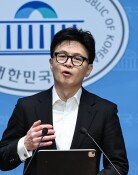Brace for U.S. interest rate hike this year
Brace for U.S. interest rate hike this year
Posted September. 19, 2015 07:03,
The United States has left benchmark interest rates unchanged at a time when the world`s attention was drawn to whether it will increase or freeze the rate. After a Federal Open Market Committee meeting on Thursday, the Federal Reserve Board said it decided to keep the benchmark rate intact at 0 to 0.25 percent. While keen attention was drawn to whether Washington would give up its zero rate policy adopted at the height of the global financial crisis in December 2008, the U.S. has decided to postpone the timing of the initiation of its exit strategy. Global financial market breathed a sigh of relief after the announcement. In South Korea, the main stock index rebounded to 1,995 points, nearing the 2,000-point mark.
The U.S. decision to freeze its benchmark rates was in large part affected by the global economic depression in addition to low consumer prices in the U.S. Backing such an analysis, Federal Reserve Chair Janet Yellen told a news conference that overseas economic outlook had become more uncertain and that heightened concerns over China and other emerging markets caused instability in the financial market. It was rare for the U.S. Fed to take significant consideration into overseas factors, suggesting the seriousness of uncertainties, instability and inter-dependence in the global economy.
After nearly seven years of U.S. zero-interest policy and monetary expansion, the supply of dollars in the world has nearly quadrupled since 2008. In the U.S., the prevailing view is that a rate hike within this year is inevitable, considering the controversies over economic "bubbles" caused by a booming economy coupled with monetary easing. A U.S. rate hike would cause massive amounts of U.S. dollars to flow from emerging market back into the U.S., almost certainly sending tremendous shockwaves to the global financial markets.
South Korea has suffered from steeper declines in stock prices than other emerging economies every time the U.S. increased its benchmark interest rates. Although Seoul`s economic and financial situation is relatively stable recently. However, it is in no position to be relieved by the U.S. rate freeze. The government and the central Bank of Korea should encourage financial institutions and corporations to secure sufficient foreign exchange liquidity and pay close attention to stably managing the won-dollar exchange rates. In addition, household debts and restructuring of insolvent businesses that are considered the weakest spots in the Korean economy also need careful attention.



![[단독]김경 “1억원 줄때, 강선우도 함께 있었다” 자수서](https://dimg.donga.com/c/138/175/90/1/wps/NEWS/IMAGE/2026/01/14/133148772.5.jpg)



